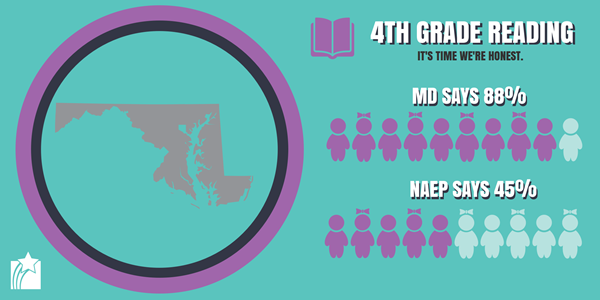TALLAHASSEE, Fla., Sept. 30, 2015 (GLOBE NEWSWIRE) -- Maryland has been overestimating its students' mastery of knowledge and skills, a practice that can impede their ability to transition from high school graduation to college or a meaningful career path. That, in turn, will impact Maryland's ability to compete in a 21st century economy that increasingly demands more skilled and better educated workers. Right now, Maryland's leaders have the opportunity to save its students from a future of remediation and an irreversible skills gap. Soon, new state proficiency expectations will be announced and implemented.
"To be perfectly clear, Maryland's passing scores on its state assessments have no meaning. Scores must reflect in-depth knowledge of the subjects tested. If passing a test is not indicative of mastering the material, then it's a hollow accomplishment at best. Requiring more of students always will be harder than requiring less. But this is a challenge that can be overcome by adopting higher proficiency expectations and raising the bar, which will result in Maryland students being in a better position for long-term success in college and careers,'' said Patricia Levesque, CEO of the Foundation for Excellence in Education.
The state's low academic expectations can be quantified by comparing results on state tests with results from the National Assessment of Educational Progress (NAEP). Also known as the Nation's Report Card, NAEP is considered the gold standard in measuring academic achievement and progress.
Looking at results from 2013, Maryland's state-administered tests indicated that 88 percent of fourth-grade students were proficient readers. However, NAEP results from that year found only 45 percent of fourth graders had achieved reading proficiency.
The numbers for eighth grade math are just as discrepant, with state tests indicating 81 percent of students were proficient in the subject compared to NAEP results of only 42 percent.
Simply put, Maryland is setting its proficiency expectation too low. This conveys a false sense of student achievement to parents, teachers and educators. And it comes with consequences:
- Nearly 22,700 Maryland freshmen students entering two-year colleges require remediation and almost 16,000 entering four-year colleges require remediation.
- Maryland students seeking a four-year bachelor's degree lose up to $67,700 each additional year they don't graduate on time. ($22,000 in cost of attendance and $45,000 in lost wages.)
- Nearly 27 percent of the Maryland high school graduates that take the United States Army's Armed Services Vocational Aptitude Battery (ASVAB) are found ineligible.
- In 2014, Maryland's unemployment rate was 5.8 percent.
Visit WhyProficiencyMatters.com/Maryland for more facts, graphics and sharable content. Join the conversation online with the hashtag #ProficiencyMatters.
Sources:
- Complete College America, Remediation: Higher Education's Bridge to Nowhere, 2012
- Source: Complete College America, Four Year Myth, 2014.
- The Education Trust, Shut Out of the Military, December 2010
- U.S. Department of Labor, Bureau of Labor Statistics, Regional and State Unemployment (Annual) News Release)
For more information visit www.ExcelinEd.org.
View release online.
The Foundation for Excellence in Education is igniting a movement of reform, state by state, to transform education for the 21st century economy by working with lawmakers, policymakers, educators and parents to advance education reform across America. Learn more at ExcelinEd.org.
A photo accompanying this release is available at:
http://www.globenewswire.com/newsroom/prs/?pkgid=36563
